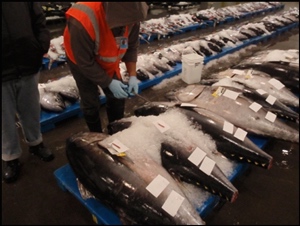Posted 3/29/13
An error in the Commerce Appropriations Act for 2013 could curb the catch of bigeye tuna by Hawai`i-based longline vessels just as the high-demand holiday season starts up.
As readers of Environment Hawai`i may recall, in November 2011, Congress exempted the longliners from the catch limit of 3,763 metric tons imposed on them by the Western and Central Pacific Fisheries Commission. It did this by allowing portions of their catch of bigeye to be attributed to U.S. territories in the Pacific – American Samoa, Guam, and the Commonwealth of the Northern Marianas Islands. That quota exemption expired on December 31, 2012.
When Congress passed the 2013 appropriations act in March, it inserted language apparently intended to push the date back a year, to the end of this calendar year. However, the final language in the act amends the wrong section of the earlier legislation – referring to Section 113(b)(3) – instead of Section 113(c) of the original bill.
In the days when Sen. Daniel K. Inouye chaired the Senate Appropriations Committee, it is unlikely such an error would have made it out of the committee draft. Now, however, Hawai`i fishermen have no such staunch ally on the key committee. Mike Tosatto, administrator of the National Marine Fisheries Service office in Honolulu, said his agency was aware of the glitch before the bill passed Congress.
If Congress does nothing to fix the error by the time the longliners meet their WCPFC quota, they will either have to stop fishing for bigeye or will have to set their lines in the more distant waters of the eastern Pacific Ocean, where catches of tunas are regulated by the Inter-American Tropical Tuna Commission.
There is one more scenario: the Western Pacific Fishery Management Council could amend its fishery management plan for the Western Pacific region to allow for assignment of bigeye catches to the territories, the Secretary of Commerce could approve the amendment, and the implementing regulations would have to take effect.
The likelihood of that happening before the end of the year? Go fish!



Leave a Reply